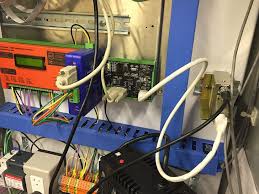Introduction
Although the PLC has been with us for more than forty years, its role in the industrial environment is widely accepted. For many of its early years its role was confined to simple sequence control and interlocking. Later, however, with the advance of increasingly sophisticated microprocessor technology, analog capability – particularly PID control –, and communications, it became an integral part of the PLC functionality. However, the PLC was essentially blind and it was really only with the advent of current generation of Supervisory Control and Data Acquisition (SCADA) systems that the PLC/SCADA took on a new life – competing directly with advanced DCS systems and other advanced automation systems.
This workshop, SCADA and Telemetry Systems, is designed to provide engineers and technicians with the basic theoretical and practical understanding of SCADA systems together with an overview of modern digital communication standards and networks – starting at the basic RS232 standard right through to Modbus over TCP/IP and how this can be applied to optimize their systems in terms of safety, flexibility and costs. The workshop also discusses modern radio links, ranging from application through to troubleshooting, and the use and selection of wireless link devices.
Objectives
On successful completion of this workshop delegates will be able to:
- Recognize the different components of a SCADA system
- Appreciate the basic principles of data communications
- Evaluate the requirements for PLC-to-SCADA communications
- Understand the importance of the ISO OSI model
- Appreciate the use of wireless communications in the industrial environment
- Recognise the various wireless communication standards
- Apply radio telecommunications in a practical manner and make use of troubleshooting techniques
- Understand the concept of Modbus/Serial and Modbus/TCP
- Apply Modbus in a practical manner and make use of troubleshooting techniques
- Understand modern SCADA applications and deployments
Training Methodology
Designed for both novice and experienced engineers and technicians, this workshop provides an insight into modern SCADA and digital communication principles. Throughout the workshop, participants will learn through active participation using exercises, questionnaires, and practical simulation and demonstration sessions covering:
- Realization of various communication strategies
- Networking
- Hardware diagnostics
- Basic programming
- Modbus operation
- Operations
- Maintenance
Organizational Impact
Following the training and development experience provided by this workshop, participants will return to their organizations equipped with new skills and knowledge that will enable them to evaluate the impact of new and existing SCADA and Telemetry technologies as they relate to your plant’s automation strategy and apply a rationalized philosophy based on the best available practices. By leveraging these skills, your enterprise can expect an improvement in overall productivity through the reduction in downtimes resultant from inappropriate automation strategy and through the ability to apply, install, and troubleshoot a modern SCADA and Telemetry systems.
Personal Impact
On successful completion of course delegates will be able to:
- Understand SCADA and Telemetry Systems and their impact on process automation
- Select and specify various technology choices and know how to apply them
- Understand process and plant operation and how SCADA and Telemetry helps optimize their operation
- Learn about Instrumentation, RTUs, Networking, and HMIs and how they can be assembled to provide powerful SCADA and Telemetry systems
- Appreciate the impact of SCADA and Telemetry Systems through real life and practical demonstrations on simulated processes
- Network with other delegates and exchanging ideas, problems and solutions about similar issues
Who Should Attend?
- Professionals involved in designing, selecting, sizing, specifying, installing, testing, operating and maintaining process instrumentation and control systems
- Automation Engineers
- Chemical Engineers
- Consulting Engineers
- Design Engineers
- Electrical Engineers
- Electricians
- Instrument and Process Control Engineers and Technicians
- Maintenance Engineers
- Mechanical Engineers and Technicians
- Operations Engineers
- Process Engineers
- Project Managers
- System Integrators
- Professionals with little to moderate production facility design and/or operations background
- Other professionals who want a better understanding of the subject matter
SEMINAR OUTLINE
DAY 1
Introduction to SCADA systems
- Overview
- Modern Instrumentation and Control Systems
- “Smart” Instrumentation
Basic communication principles
- Overview
- Transmission Modes
- Digital systems
- ASCII Code
- Description of UART
- Standards
Numbering systems
- Binary numbering
- Hexadecimal
SCADA systems
- Hardware and software architecture
- Functionality and alarm handling
- Marshalling terminals and RTUs
- Basic communication system
- Application development
- Engineering
Remote Terminal Units (RTUs)
- Introduction
- RTU environmental enclosures
- Control processor and memory (CPU)
- Digital processing
DAY 2
Communications media
Serial Data Communications
ISO OSI model
Error detection
HART Protocol
Modbus Protocol
DAY 3
SCADA Instrumentation
- Overview
- Block Diagram
- Sensors
- Electronics
- Power considerations
- HMI
- Installation, Maintenance, Troubleshooting
- Transmitter
- SCADA channels: wired & wireless
- Examples
DAY 4
SCADA System Architecture
- Control Room
- Supervisory control
- PLC
- DCS
- Fieldbus: Profibus, Foundation Fieldbus
- Sensors & Actuators
- Communication Links and channels
- HMI
- Alarms
- PLC – SCADA communications
Telemetry: Wireless Links
- Elements of a Radio Link
- The radio spectrum and frequency allocation
- IEEE Wireless standards
- Examples of devices
- Implementation
- Miscellaneous Considerations
DAY 5
Products
- Siemens WinCC and SIMATIC
Applications
- Chemical plant
- Oil & Gas
- Waste Water Treatment
- Boiler automation
Demonstrations
- Intelligent irrigation system
- Intelligent industrial security system
The Future
- Industrial Internet (II)
- SCADA and the Internet of Things (IoT)
- IP Protocol Version 6: Ipv6

